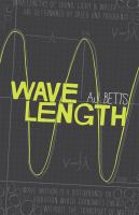Speaking of tangents

An interview with A.J. Betts by Fran Knight
Tangent: Trigonometric function that is equal to the ratio of the
sides (other than the hypotenuse) opposite and adjacent to an angle
in a right triangle.
A.J. Betts, author of Wavelength and Shutterspeed,
two adolescent novels published by Perth's Fremantle Press, loves
muffins, but the idea for her latest novel, Wavelength came
unexpectedly from a bad experience with her favourite treat. Venting
her outrage on her trusty lap top for an hour or so, gave her the
idea for Oliver's mother, a hard pressed single mum, furiously
making muffins from some god forsaken hour in the morning to create
an income for the family. Oliver, a demented year 12 student, is
slavishly following his peer group in obsessing about his exams, all
to get a particular university entrance score. The two forces are
bound to clash, and they do so with spectacular results.
This stream of consciousness approach worked exceptionally well with
Wavelength, but it was quite the opposite with Amanda's first
book, Shutterspeed. She took a text book approach with this
story, making up character profiles, plotting a course of action for
the tale, developing lines of plot. Both approaches worked well,
making the development of characters a line I wanted to pursue when
interviewing A. J. Betts recently. But tangents kept getting in the
way.
Part of Wavelength is set, most satisfyingly in a retirement
village. An idea fraught with danger, I thought, because it lends
itself to the observation of the elderly as a homgeneous group,
displaying characteristics bounded by their ages. But in Amanda's
hands, no such cliche is obvious. Each person has a delineated
personality, each can be viewed as a separate entity with their own
story. One is based on Amanda's grandfather, another of a woman with
dementia she met in a shopping centre, another through observations
of older people in an aquarobics class.
But what about those chapter headings? I hesitated to ask.
The Wavelength chapter headings, mysteriously offering the
reader a brief tangental look into long forgotten physics lessons or
things still being committed to memory, reflect the nature of the
emotional regime Oliver is experiencing at the time - as well as
Amanda's recent interest in science. Interestingly the chapter
headings were about rocks, with the book divided into three
sections, Igneous, Metamorphic and Sedentary, the chapter headings
reflecting the rocks of those eras, ranging from the very hard to
the more malleable and softer rocks at the end, when Oliver has at
last realised just what he wants to do. Amanda adores metaphors!
A teacher with the Western Australian Education Department in the
Hospital School, Amanda loves the variety of work this offers. But
writing was always her aim, so much so that when she drove to Perth
in 2004, from her then home in Brisbane, she made herself a promise
that she would stay in Perth until she had a novel published. Now
with two published and another manuscript (entered for the Vogel
Award in 2010 because that was the last year she fitted the
criteria) receiving encouragement to develop the story further, she
has some decisions to make.
But writing full time means earning money from other sources, so she
is investigating further the possibilities of school visits.
Mentorships from societies such as the May Gibbs Children's
Literature Trust means that time can be spent unhindered for a
little while, taking time out just for writing and collecting
stories. And Fremantle Press with its editor, have been solid in
their support of Amanda and her work.
Amanda is excited that her novel, Wavelength, has been
shortlisted for the Western Australian Premier's Award, where she is
one amongst a group of authors whose names are far more well known.
Not surprisingly, Amanda has found that people have questioned
whether she would be better off living in the eastern states. And
this is another question with which she will need to grapple.
Another tangent which takes her away from writing.
With a list of the best cafes in the city to visit, Cibos, Brown
Dog, Nanos, as well as places in Croydon and North Adelaide, from
friends suggestions and her own googling, Amanda is well attuned to
Adelaide life for the four weeks she is here for her Fellowship.
Cafes are wonderful places to write, so you may see a young woman in
bike lycra, tapping away on her lap top, listening into
conversations, watching for a diversion to give her more material
for her writing.
Tangent: Adjective
(of a line or plane) touching, but not intersecting, a curve or
curved surface.
Fran Knight